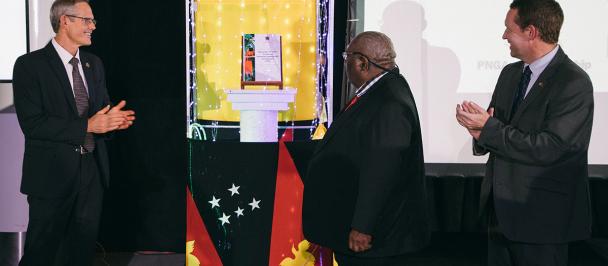To enhance the financial management and business planning for Papua New Guinea’s Protected Areas Network, 22 participants representing various Protected Areas in Eastern Highlands, Chimbu and Jiwaka Provinces attended a Financial Management Training in Goroka on 4-6 June 2024.
UNDP hosts a training to enhance the financial management of Papua New Guinea’s Protected Areas
July 2, 2024

Representatives of various organizations responsible for managing Protected Areas in the Papua New Guinean Highlands attended the training
The training was organized by the Sustainable Financing of Papua New Guinea’s Protected Area Network Project, which is jointly implemented by UNDP and the Conservation and Environment Protection Authority (CEPA) with funding provided by the Global Environment Facility (GEF).
Less than 15% of the existing gazetted 62 protected areas in Papua New Guinea currently receive any financial support. The National Protected Areas Finance and Investment Plan of the Government of Papua New Guinea estimates that in order for Papua New Guinea to reach 100% of the Aichi Target 11, which calls for the conservation of at least 17% of terrestrial and inland water areas and 10% of coastal and marine areas globally, an annual investment of US$75 million on managing Protected Areas is required.

The training strengthened the participants' understanding of financial governance and strengthen their budget management skills.
The Project has established a Biodiversity and Climate Fund to mobilize resources towards achieving this aim. Despite significant progress, the business planning and financial management capabilities of the communities and organizations responsible for managing Papua New Guinea’s Protected Areas remain limited. The Fund is actively working to address these gaps by building the financial management capacities of these communities and organizations.
The training held in Goroka aimed to enhance the participants’ understanding of financial governance, bookkeeping, and policy requirements and strengthen their budget management, cash-flow forecasting, and financial reporting skills. The participants also learned about the Biodiversity and Climate Fund’s objectives and how they could apply for funding from it.

Anna Yambo, Provincial Women’s Development Officer from the Simbu Provincial Government presenting her group work
"This training is a milestone. Financial literacy and governance are essential for protecting our natural resources that our communities depend on. This project is teaching us many new things that will enable us to carry out conservation activities more effectively in our respective provinces,” stated Anna Yambo, Provincial Women’s Development Officer from the Simbu Provincial Government at the end of the training.
"I am from the village and have no formal educational background. That is why I am so grateful to have received the opportunity to attend this training, which will help me in running my little association in the future,” added Elis Kolip, a representative of the Parmel Community Development Group from Nondugl District in Jiwaka Province.

 Locations
Locations

